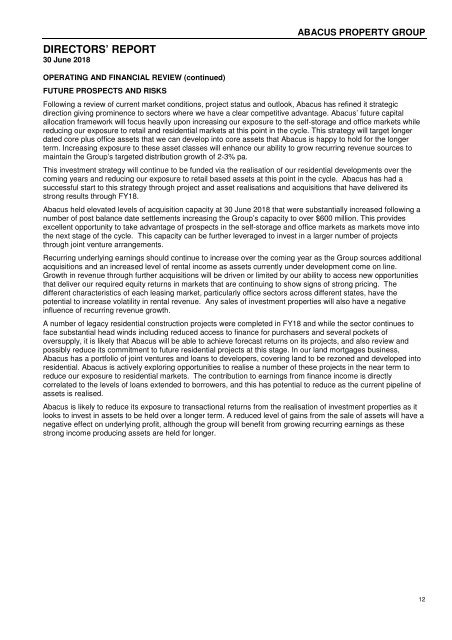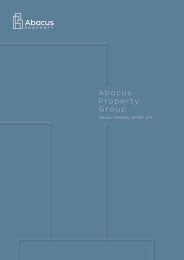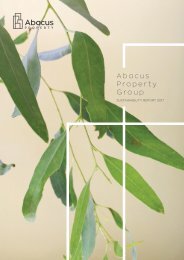Abacus Property Group – Annual Financial Report 2018
Create successful ePaper yourself
Turn your PDF publications into a flip-book with our unique Google optimized e-Paper software.
DIRECTORS’ REPORT<br />
30 June <strong>2018</strong><br />
ABACUS PROPERTY GROUP<br />
OPERATING AND FINANCIAL REVIEW (continued)<br />
FUTURE PROSPECTS AND RISKS<br />
Following a review of current market conditions, project status and outlook, <strong>Abacus</strong> has refined it strategic<br />
direction giving prominence to sectors where we have a clear competitive advantage. <strong>Abacus</strong>’ future capital<br />
allocation framework will focus heavily upon increasing our exposure to the self-storage and office markets while<br />
reducing our exposure to retail and residential markets at this point in the cycle. This strategy will target longer<br />
dated core plus office assets that we can develop into core assets that <strong>Abacus</strong> is happy to hold for the longer<br />
term. Increasing exposure to these asset classes will enhance our ability to grow recurring revenue sources to<br />
maintain the <strong>Group</strong>’s targeted distribution growth of 2-3% pa.<br />
This investment strategy will continue to be funded via the realisation of our residential developments over the<br />
coming years and reducing our exposure to retail based assets at this point in the cycle. <strong>Abacus</strong> has had a<br />
successful start to this strategy through project and asset realisations and acquisitions that have delivered its<br />
strong results through FY18.<br />
<strong>Abacus</strong> held elevated levels of acquisition capacity at 30 June <strong>2018</strong> that were substantially increased following a<br />
number of post balance date settlements increasing the <strong>Group</strong>’s capacity to over $600 million. This provides<br />
excellent opportunity to take advantage of prospects in the self-storage and office markets as markets move into<br />
the next stage of the cycle. This capacity can be further leveraged to invest in a larger number of projects<br />
through joint venture arrangements.<br />
Recurring underlying earnings should continue to increase over the coming year as the <strong>Group</strong> sources additional<br />
acquisitions and an increased level of rental income as assets currently under development come on line.<br />
Growth in revenue through further acquisitions will be driven or limited by our ability to access new opportunities<br />
that deliver our required equity returns in markets that are continuing to show signs of strong pricing. The<br />
different characteristics of each leasing market, particularly office sectors across different states, have the<br />
potential to increase volatility in rental revenue. Any sales of investment properties will also have a negative<br />
influence of recurring revenue growth.<br />
A number of legacy residential construction projects were completed in FY18 and while the sector continues to<br />
face substantial head winds including reduced access to finance for purchasers and several pockets of<br />
oversupply, it is likely that <strong>Abacus</strong> will be able to achieve forecast returns on its projects, and also review and<br />
possibly reduce its commitment to future residential projects at this stage. In our land mortgages business,<br />
<strong>Abacus</strong> has a portfolio of joint ventures and loans to developers, covering land to be rezoned and developed into<br />
residential. <strong>Abacus</strong> is actively exploring opportunities to realise a number of these projects in the near term to<br />
reduce our exposure to residential markets. The contribution to earnings from finance income is directly<br />
correlated to the levels of loans extended to borrowers, and this has potential to reduce as the current pipeline of<br />
assets is realised.<br />
<strong>Abacus</strong> is likely to reduce its exposure to transactional returns from the realisation of investment properties as it<br />
looks to invest in assets to be held over a longer term. A reduced level of gains from the sale of assets will have a<br />
negative effect on underlying profit, although the group will benefit from growing recurring earnings as these<br />
strong income producing assets are held for longer.<br />
12











